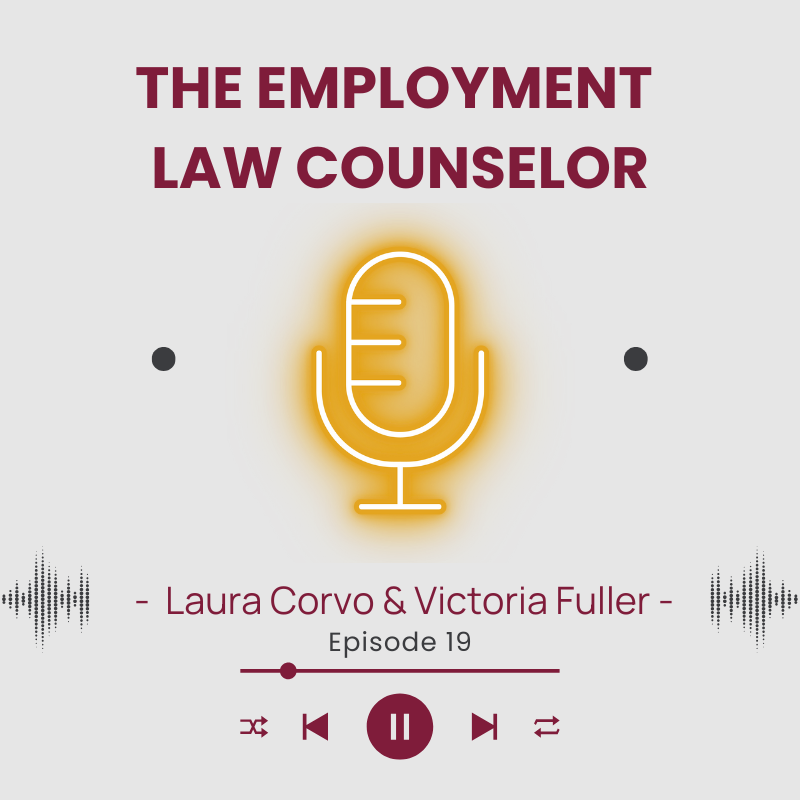August 5, 2021
The Legacy of #MeToo

Robert G. Chadwick, Jr.
Managing Member, Seltzer, Chadwick, Soefje & Ladik, PLLC
Robert Chadwick is a Managing Member of the law firm of Seltzer, Chadwick, Soefje & Ladik, PLLC. He has more than 36 years of experience representing management, fiduciaries and professionals in the areas of labor and employment law, ERISA investigations and litigation, and professional liability. He is Board Certified in Labor & Employment Law by the Texas Board of Legal Specialization.
On October 5, 2017, a New York Times article uncovered multiple sexual harassment complaints against film executive Harvey Weinstein. The article prompted hundreds of women, and some men, to tell their stories of harassment by celebrities and politicians. #MeToo spread virally as a hashtag on social media. Time magazine named the Silence Breakers as its Person of the Year.
Four years later, the legacy of the #MeToo phenomenon is still being written. The true impact of #MeToo has been a subject of hot debate. What cannot be debated are the seismic changes which have taken place in the legal landscape surrounding sexual harassment in the private workplace.
To be sure, sexual harassment in the private workplace has long been held to be outlawed by Title VII of the Civil Rights Act of 1964 (Title VII). The U.S. Supreme Court declared as much in 1986 in Meritor Savings Bank v. Vinson. Still, the reach of Title VII is limited.
In the #MeToo era, other legal avenues sprang up to fill the gaps of Title VII. Many states and municipalities moved swiftly to provide greater protections to victims of sexual harassment. Shareholder lawsuits also held companies accountable for inaction or misrepresentations regarding workplace harassment.
I. Agreements
Until 2017, non-disclosure, arbitration and settlement agreements kept the substance and number of harassment allegations against Harvey Weinstein secret for decades. Nothing in Title VII purports to expressly prohibit such agreements.
Not surprisingly, therefore, non-disclosure, arbitration, and settlement agreements limiting transparency of sexual harassment claims were an early target of state legislation in Arizona, California, Illinois, Maryland, New Jersey, New York, Oregon, Tennessee, Vermont, and Washington. Even the federal Internal Revenue Code was amended to prohibit employers from deducting any settlement or payment related to sexual harassment or sexual abuse if such settlement or payment is subject to a nondisclosure agreement or attorneys fees related to such a settlement or payment.
II. Smaller Employers
Title VII covers only employers with 15 or more employees. In the wake of #MeToo, some jurisdictions, such as New York, enacted legislation extending protections against sexual harassment in the private workplace to smaller employers.
III. Individual Liability
Federal jurisprudence also holds individual liability is not available under Title VII. In the aftermath of #MeToo, some states, such as California, expanded individual liability for sexual harassment in the workplace.
IV. Non-Employees
Title VII also purports to protect only an employers employees, and not independent contractors providing services for an employer. Some states, such as New York, eliminated this limitation by extending sexual harassment protections to contractors, subcontractors, vendors, consultants, and others providing services in the workplace.
V. Hostile Work Environment
To be violative of Title VII, sexual harassment in the workplace, other than quid pro quo harassment, must generally be severe or pervasive. In the past four years, some states significantly lowered this threshold. In New York, for example, harassment can be shown merely by showing that an individual was subjected to inferior terms, conditions, or privileges of employment. It is up to the employer to show the actions were not more than petty slights or trivial inconveniences.
VI. Employer Liability
In Faragher v. City of Boca Raton, and Burlington Indus., Inc. v. Ellerth, the U.S. Supreme Court recognized an affirmative defense to claims of supervisory sexual harassment. Under this defense, an employer can avoid liability under Title VII by showing (1) the defendant employer exercised reasonable care to prevent and correct promptly any sexually harassing behavior; and (2) the plaintiff employee unreasonably failed to take advantage of any preventive or corrective opportunities provided by the employer or to avoid harm otherwise.
In recent years, some states curtailed the Faragher/Ellerth defense under state law. In New York, for example, an employee does not have to complain to his/her employer to establish liability for sexual harassment.
VII. Statutes of Limitation
Depending upon the jurisdiction, a charge of discrimination under Title VII must be filed with the Equal Employment Opportunity Commission, or its state or local equivalent, in 180 days or 300 days. Many victims complained this period was much too short.
In response to such complaints, some jurisdictions extended the statutes of limitation for asserting sexual harassment claims. In New York, for instance, the statute of limitations was lengthened from one to three years.
VIII. Policies & Training
Although most employers understand the value of sexual harassment policies and training under the Ellerth/Faragher defense, nothing in Title VII requires such policies and training. Federal jurisprudence has otherwise been inconsistent as to the efforts which must be undertaken by employers to avail themselves of the defense.
Since 2017, many jurisdictions have thus enacted laws with specific requirements as to sexual harassment policies and training. Such jurisdictions include California, Connecticut, Delaware, District of Columbia, Maine, Massachusetts, New York, New York City, and Washington. The specific requirements vary by state but include (1) the content of policies and training, (2) the manner of training, (3) the frequency and length of training, and (4) the credentials necessary to provide training.
IX. Government Oversight
Under Title VII, ongoing governmental oversight of employers is, absent a consent decree, generally limited to the EEO-1 form which must be filed annually by private employers with 100 or more employees. A few states, such as Maryland and Vermont, enacted legislation providing greater oversight as to sexual harassment.
Maryland now requires employers with 50 or more employees to submit surveys to the Maryland Commission on Human Rights detailing settlements of sexual harassment claims. Vermont authorizes the state attorney general to enter and inspect any place of employment to determine whether the states sexual harassment laws are being followed.
X. Big Settlements
The past four years have also witnessed big settlements in #MeToo-related shareholder litigation. In 2020, Google settled a shareholder suit alleging the company mishandled complaints of sexual misconduct or harassment for $310 million.
Also in 2020, Signet Jewelers reached a $240 million settlement in a securities class action which alleged the company had made misleading public statements regarding #MeToo litigation.
Just last month, L Brands, Inc., the parent of Victorias Secret, agreed to a $90 million settlement of shareholder lawsuits that alleged a toxic culture of sexual harassment at the company.
XI. Texas
As they say on television but wait, theres more.
For some time, sexual harassment reforms were limited to states and municipalities with employee-friendly laws. Other states were resistant to such reforms. Some questioned whether the impact of #MeToo had stalled. That all changed this year in, of all places, Texas.
In a state with some of the most employer-friendly laws in the nation, new sexual harassment reforms were enacted into law in 2021. What began as partisan legislation, ended with overwhelming support in the House, unanimous support in the Senate, and the signature of Governor Greg Abbott.
The new laws, which are effective September 1, 2021, make four major changes to existing Texas law. First, the laws provide that employers with only one employee are subject to the states law outlawing sexual harassment at work. Under current Texas law, only employers with 15 or more employees are covered.
Second, the new laws state that any individual who acts directly in the interests of an employer in relation to the employee may be personally liable for sexual harassment. Personal liability is not permitted under current Texas law.
Third, the new laws allow liability to be established if the employer or the employers agents or supervisors: (a) [knew] or should have known that conduct constituting sexual harassment was occurring; and (b) [failed] to take immediate and appropriate corrective action. This differs from existing Texas law which allows an employer to avoid liability under the Ellerth/Faragher defense.
Finally, the new laws extend the deadline for filing a complaint of sexual harassment from 180 days to 300 days.
Next month, therefore, three of the four most populous states in the U.S. will have sexual harassment laws more extensive than Title VII.
XII. Will Other States Join Texas?
It remains to be seen whether other traditionally employer-friendly states will join Texas in enacting sexual harassment reforms. The reforms in Texas proved to be politically popular and were enacted with overwhelming bipartisan support. Accordingly, employers and insurers should expect at least some traditionally employer-friendly states will enact similar reforms.
So, what will the #Metoo phenomenon yield in the next four years? To again borrow a phrase from television – stay tuned.
News Type
PLUS Blog
Business Line
Employment Practices Liability (EPL)
Topic
Professional Liability (PL) Insurance
Contribute to
PLUS Blog
Contribute your thoughts to the PLUS Membership consisting of 45,000+ Professional Liability Practitioners.
Related Podcasts

The Employment Law Counselor Episode 19
Reductions in Risk for Reductions in Force In this episode of The…
Related Articles

Navigating EPL Trends Across North America: Key Risks and Insights for 2025 Webinar Recap
Employment Practices Liability (EPL) risks are becoming increasingly complex as workplace norms…

Mitigating the Risks of Reductions in Force: Lessons from The Employment Law Counselor
In the latest episode of The Employment Law Counselor, hosts Victoria Fuller…

Employment Discrimination and Retaliation – Best Practices to Avoid Headaches
There is little doubt that an employment-discrimination lawsuit is an unsettling experience…
